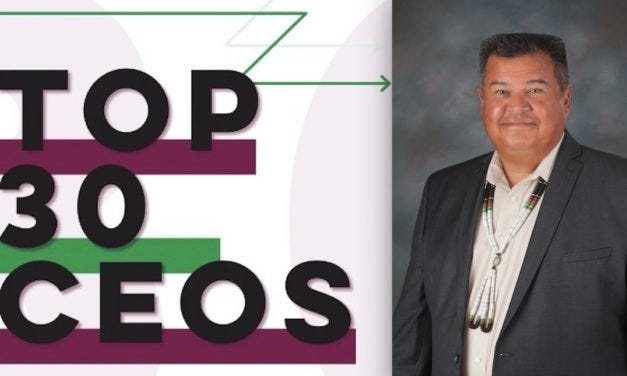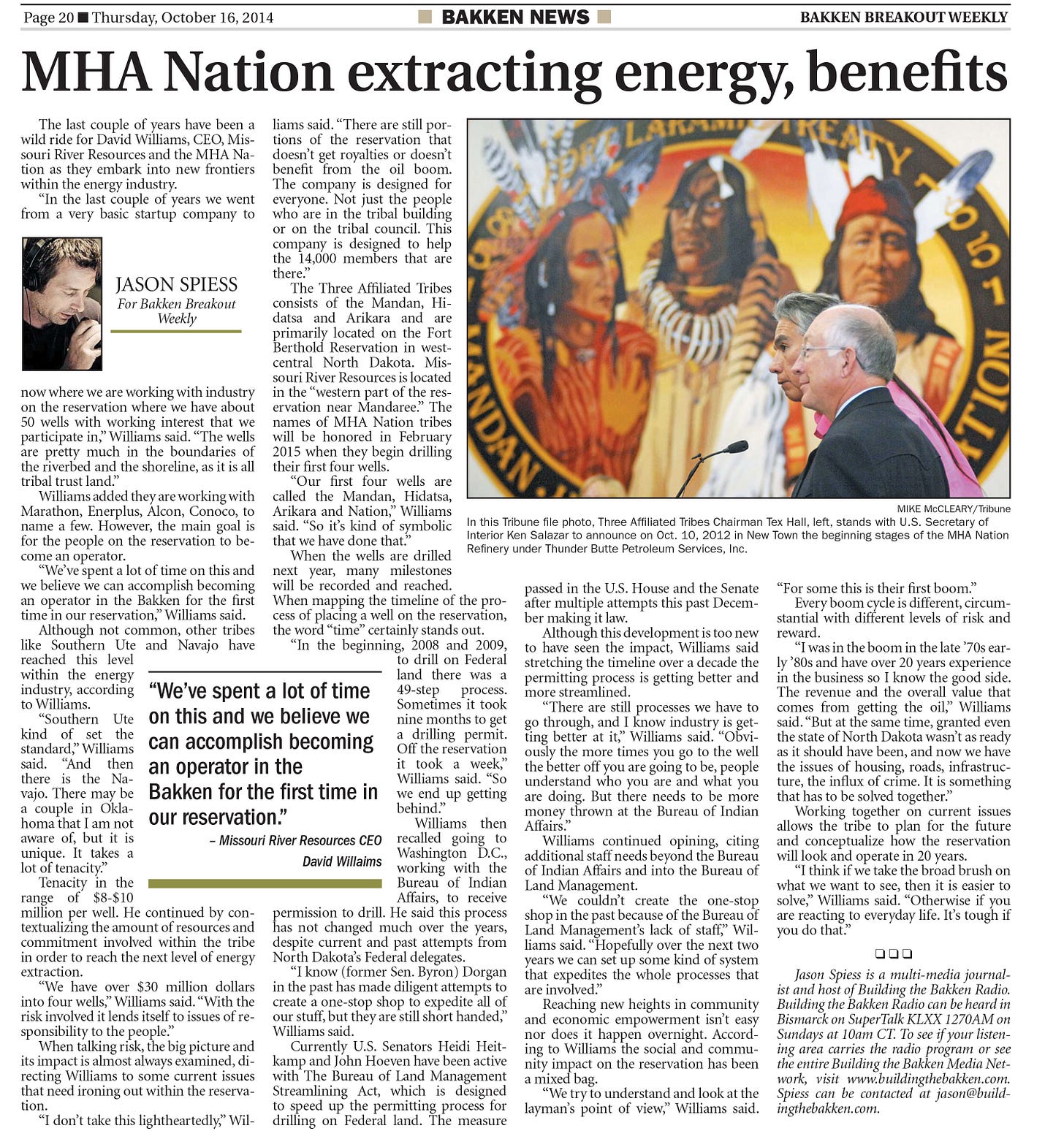
David Williams, Missouri River Resources, gives an update on oil production from Missouri River Resources and how the Reservation and New Town areas are fairing during the downturn with oil prices.
Williams describes how the Native American run oil company is training their employees and preparing them for the Bakken as well as other shale plays across the nation.
Williams was just 19 years old when he started working in the oil field. It was the summer after his freshman year at Dickinson State University, where he played college football. “I was a rookie — they call them grunts or worms, a new guy who’s the greenhorn in the oil field,” Williams laughs. “My first day at work, I was pulling pipe out of the ground.”
Below is the raw, unedited transcript from our artificial intelligence translator.
David Williams
Dave Williams ceo of Missouri River resources,
Jason Spiess
Missouri River resources, Alright, let's start out by talking about what's going on with your company just kind of a 2,016 review in a 2,017 projection if you would.
David Williams
Well 2016 Review I pretty much can say as the survival of the fittest. You know, you just, I think we, you know, being a small company, we have a little advantage of you know, having just one debtor and um you know just paying our bills as as we you know make as much production as we can, you know, keeping it slim. You know, I had to lay off a few people, I mean that's part of the game, part of the business and you know it's unfortunate but you know, we uh we also rely on the fact that oil is a
commodity and it's influenced by global forces. So um we're trying to be as optimistic as we can. Um I believe we'll have an advantage maybe I say maybe but you know with the new president, but at the same time Saudi Arabia and opec and you know, even the non Opec countries cut back production. We can I think the word for the year was rebalancing, you know, I'm getting a lot of articles, you know where people can function maybe at $65-$70 a barrel get too high or getting too low.
So I think the the earth or the globe, so to speak and all of the economics that entail that with oil and gas can can come to a guess an agreement that, You know, this price scale, you know, uh from 65 to 70 would be beneficial for all. So hopefully, hopefully, hopefully that'll uh that'll keep up as you anticipated. So having said all that 2017, you know, we again, you know, I think we're still on the same focus of Really drilling.
We've we've acquired lands in, in the past year and a half that brought us to a project that we want to drill 23 wells in a few sections down on the reservation. So um we're pretty, I guess pretty happy about that. Um our our lender or bank uh seems very optimistic about moving forward. So um all this does take time, you know, a year ago, february oils in the twenties.
So um I, we couldn't find a bank, you know, probably borrow us, you know, even $200,000 because of the way things were happening. So now that we're here a year later, uh we're pretty, we're pretty fortunate to again, be, be still viable and and and moving forward and keeping our experts and keeping our staff and um in the trap, understanding that now that they realize, you know, that that price reduction hurt their royalties and, you know, in the
state and the tribe, you know, again, finding to create a budget that that works for everyone. Um I wouldn't want that job, but uh, you know, in a sense that's what we do on a, so
Jason Spiess
you mentioned additional steps, you've got to go through with the BLM and with B. A. And just some of those federal lands and reservations and that sort of thing is that um are you hearing from any other tribes across the country? Are they starting to do some of the things that you guys are doing?
I know in the past you've mentioned Utah the youths of gotten some mineral interests and rights and that sort of thing. Is there is there any anything along those lines with other tribes that you guys are either teaching or collaborating with?
David Williams
Um When I first started, I used, I reached out to the southern use they had a I think they've pretty much uh streamlined their process to where they're just doing it on their own. I think they've limited the B. I. A. So to speak. Uh I'm not quite sure of that, but um that's always been the word there that uh they they, you know, make their own decisions on their own land.
Um So, you know, the B. I. A. Still has, you know, federal government still has the financial responsibility until we 6 38 everything or you know, take it upon ourselves to regulate. Um we're still in that under that umbrella. So you know, we we've talked to other reservations and it's it's it's the same, it really, again, because it's always different, you know, on, you know, the circumstances, but the process of getting permits to drill or air quality permits to maybe create a
refinery or you know, permits to do cole um Natural gas. It's still the same all over, as long as the federal government's under the Oscars is um uh you know, the official responsibility that they that they have. So our governments change every 2-4 years and you know, sometimes it's hard to pass that baton on and what somebody wants to do and um and with somebody, you know, just like America, you know what I mean?
You have the president that worked eight years and then the next president comes in and says, well I'm gonna Repeal everything that you've done. I mean we've encountered the same thing. So uh boy, it's tough again. You know, I'm uh I'm going on 10, I am 10 years here back and trying to, you know, not reinvent the wheel, but you know, create some sort of nation building, you know, so we're that we're we have a shared vision on the reservation that we want to do.
Look the same thing to help everybody. Um and you know, with leadership changing and you know government changing it's it's there's a lot of moving parts and but if we all have that shared vision and I think leadership has to really voice that we can, you know work together as a nation or or and as or as indian country, you know, if we're refining and, and you know, selling gas and natural gas?
I mean to reservation in Oklahoma or Nebraska or whatever, you know, that's part of the whole big picture, I think for indian country. So, um, uh, and I'm I'm still trying to, you know, I still create relationships off the reservation, you know, just culminated a great effort and workforce development um, to the class, you know, educating our own people to get degrees in oil and gas, working with the Petroleum Council, uh, and and getting scholarships for native americans to
enter into the field. So we we've accomplished a lot. Um, but uh, is it over by by no means, you know, but uh, it's it's still a struggle and the sacrifice to really get from Point A to POINT B and where we want to be. But again, it takes time to Southern news, you know, almost 20 years. So. But uh, I think if we have that mentality, the long, you know, long term vision and just keep that, keep that fire burning will be all right.
Jason Spiess
David, Williams, Ceo, Missouri River Resources, just a couple of minutes left with him and just kind of house the reservation doing overall. How's the tribe doing overall? Um, I know that so so much opportunity came from $100 oil, $70 oil now that it's, you know, 2030 40 $50 kind of hovering around there? Are you seeing anybody closing up shops that maybe opened up during the boom? Are you seeing uh people get creative on how they're doing things?
Just kind of how, how is everybody rebalancing and streamlining maybe midstream partners that you have or even just your local community because oil and gas can create such an economic infrastructure or I mean the ecosystem that when the oil prices go down, it suffers, it has that ripple, it's like a reverse ripple that goes through there. Um, so with that being said, just kind of an update from, you know, new town and, and um, the reservation,
David Williams
well again, you know, again Jason, I obviously can't speak for everyone, but I can just start of observation, you know, um, a lot of smaller oil companies, even even a few bigger ones, you know, have filed for bankruptcy. So I mean even the big, I mean, you know people with a lot of employees laying a lot of people off even halliburton and, and uh other large oil companies, but even the smaller ones, uh, you know, depending what that monthly payment is to your, to your, to your death is,
you know, very important. But even the businesses, um, you know, if you, if your hotels are running short, I mean what do you do? I mean, you have to lower your prices now. Um, and, and so it was a struggle and if you could just hang in there, I think that's the, that was the word for 2016 or the phrase, you know, and as they get up towards 55 $60 a barrel, um, you can start, you know, as riggs came back, you could see where rigs are actually coming back and people, you know, doing, they're
doing the frack jobs that were, you know, the wells that weren't already, in fact they were drilled, but not fact the ducks so to speak. And so we see that type of activity. And so the communities are going okay, we see, we see some sort of positiveness. Uh, we see some sort of uh, movement knowing that uh, we can't, You know, the whole rebalancing thing, it can't stay at $25 a barrel, for you know for a long time and everybody is still functioning.
But uh, you know, we were, you just, you just make what you do make do what you can and, and, and uh, again you again, I guess I call it survival and if you're in the business and, and then it is for the long term, you, you think that way, but if you were in there for the quick fix and you know, going, oh my God, it's $100 barrel, $100 a barrel. And I need to do this and I need to do that.
And then all of a sudden you find yourself, you know, with way too much equipment or supplies and all of that. And then it's just sitting there um that was tough, maybe you had to sell the mask just to survive. So um But again, if it gets up to 60, I think you'll see us, you know, that you see that surge back. Um then a couple articles, you just be careful.
I mean, we get to 60 and we start, you know, and uh driller up again or really, you know, create a surge. It might be a little rebound effect. Again, I don't have a crystal ball, but um you know, who's to say that uh you know, we oversupply ourselves again, you know, I don't know, it's gonna be a lot depending on uh the trump administration.
Jason Spiess
Any final thoughts you might have about just kind of where Missouri River resources and the direction that you see the company heading.
David Williams
Well, you know, we're we're right now again, it's creating more production, more, more production means more revenue for the tribe. And you know, we're the tribal oil company. I mean by drilling are And investing, um we get 100% of those returns. If we decide not to drill and we decide not to, you know, just maybe take the royalty, that's only 18%.
So I mean, who gets the other 82, I guess that's that's been my argument when I tried to originally start the company, but uh you know, it takes money to make money. So um we're very careful on how we spend it and make sure our economics are there, you can punch a hole in the ground, but that doesn't mean you're gonna make money if you're, you know, if the oil price and the, and the price of the operation doesn't equal out in the long run, you know, you know, people can drill all they want,
but if they're not making money, it doesn't, that's not, that's not a good thing for anybody. So, um, I think in the long run, we, we do want to, you know, create equity for the tribe, for the people. I've always called this, the people's company and we've got a, We've got a plan to drill another 100 and 125 wells, but if we throw in there, you know, cost per barrel and what it does, what it takes to get it out and what it takes to move it.
You know, all of those got to come out, we're to where we're positive cash flow. Um, so that's, you know, I got a lot of experts that worked for me and that's why I leave that up to them, uh, to determine, you know, where we, where we punch and where we send our oil. So, uh, you know, I, there's anything to add is just hopefully, um, we can create some type of better economics on our transportation.
Um, I don't wanna truck oil forever. And I don't want to, you know, have a go on the rail system, you know, all, all over the United States, if, if we can pipe it, that'd be great. But uh, you know, there's a lot of situations going on, you know, about pipeline and I'm not going to comment on those, but uh, you know, I think if anybody looks at the map, you know, down by the gulf of Mexico, there's a pipeline map all over the United States.
I mean, that's, that's the best mode of transportation. And the sad part is when the industry neglects that safety issue and it overlooks they're building the pipelines of this, then we all suffer just like anybody in any profession. You know, if you're, if you pave roads and you do a bad job of paving and you're mixing your asphalt. Well, people have to redo that. So I think industry and uh, it'll be be very responsible, You know, so corporate social responsibility, you know,
we've got to take care of what, what we do as a profession to make sure that people are safe. I don't care if you're on a reservation or off the reservation. You know, if you're gonna do something that's going to impact people's lives, don't take it light hearted. That's what I got to say on that
Interview was conducted on January 16, 2017.
Submit your Article Ideas to The Crude Life! Email studio@thecrudelife.com
About The Crude Life
Award winning interviewer and broadcast journalist Jason Spiess and Content Correspondents engage with the industry’s best thinkers, writers, politicians, business leaders, scientists, entertainers, community leaders, cafe owners and other newsmakers in one-on-one interviews and round table discussions.
The Crude Life has been broadcasting on radio stations since 2012 and posts all updates and interviews on The Crude Life Social Media Network.
Everyday your story is being told by someone. Who is telling your story? Who are you telling your story to?
#thecrudelife promotes a culture of inclusion and respect through interviews, content creation, live events and partnerships that educate, enrich, and empower people to create a positive social environment for all, regardless of age, race, religion, sexual orientation, or physical or intellectual ability.
Sponsors, Music and Other Show Notes
Studio Sponsor: The Industrial Forest
The Industrial Forest is a network of environmentally minded and socially conscious businesses that are using industrial innovations to build a network of sustainable forests across the United States.
Studio Email and Inbox Sponsor: The Carbon Patch Kids
The Carbon Patch Kids are a Content Story Series targeted for Children of All Ages! In the world of the Carbon Patch Kids , all life matters and has a purpose. Even the bugs, slugs, weeds and voles.
The Carbon Patch Kids love adventures and playing together. This interaction often finds them encountering emotional experiences that can leave them confused, scared or even too excited to think clearly!
Often times, with the help of their companions, the Carbon Patch Kids can reach a solution to their struggle. Sometimes the Carbon Patch Kids have to reach down deep inside and believe in their own special gift in order to grow.
The caretakers of Carbon Patch Kids do their best to plant seeds in each of the Carbon Patch Kids so they can approach life’s problems with a non-aggressive, peaceful and neighborly solution.
Carbon Patch Kids live, work and play in The Industrial Forest.
Click here for The CarbonPatchKids’ website
Featured Music: Alma Cook
Click here for Alma Cook’s music website
Click here for Alma Cook’s day job – Cook Compliance Solutions
For guest, band or show topic requests, email studio@thecrudelife.com
Spread the word. Support the industry. Share the energy.




















Share this post